|
|
|
Sort Order |
|
|
|
Items / Page
|
|
|
|
|
|
|
| Srl | Item |
| 1 |
ID:
142472
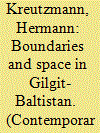

|
|
|
|
|
| Summary/Abstract |
Boundary-making in the Karakoram–Himalayan borderlands has found a diverse set of actors and expressions over time. Legacies from colonial borders are part of contemporary disputes about affiliation, participation, and space. Three aspects are addressed in this paper: first, the debate about ‘natural’ and ‘scientific’ boundaries for purposes of colonial territorial acquisition; second, postcolonial debates in the recent renaming game in Gilgit-Baltistan and its implications; and third, the attitudes of actors in exile and geopolitical players claiming to represent the aspirations of the inhabitants of Gilgit-Baltistan. The three perspectives reveal opportunities and constraints in border regimes that reflect power structures, internal and external modes of interference, and participation.
|
|
|
|
|
|
|
|
|
|
|
|
|
|
|
|
| 2 |
ID:
142474
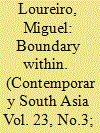

|
|
|
|
|
| Summary/Abstract |
Many inhabitants of Azad Jammu and Kashmir (AJK) hold the belief that their society is not only more egalitarian today than that of their forefathers', but also more egalitarian than that in Pakistan. According to them, Pakistani society continues to be highly hierarchical with stark class and caste-like boundaries, while in AJK these boundaries have become weaker and merely symbolic since the 1970s due to changes in four interconnected factors; namely, migration patterns, land ownership, access to education, and democratic politics. This created an unprecedented level of social mobility among and within biradaris, the caste-like kinship corporate entities that are the crucial social boundary in this region. Yet, the main factor dictating membership in the biradari – endogamy – did not change, and access to power and resources is still determined mostly through biradari-ism. In this paper, I examine how notions of hierarchy and social stratification evolved over time and what contributed to this evolution. I argue and conclude that AJK society is still hierarchical but it has gained an element of fluidity.
|
|
|
|
|
|
|
|
|
|
|
|
|
|
|
|
| 3 |
ID:
142475
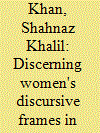

|
|
|
|
|
| Summary/Abstract |
This article challenges the notion that Kashmiri women are just silent observers/victims of an ongoing conflict and militarisation of Jammu and Kashmir. Women have utilised and impacted terrestrial public spaces, but there has been an impasse to creating a viable women's movement in the state. This analysis of digital discourses about and by Kashmiri women between 2010 and 2012 shows a discernible presence of women's discursive highways which serve to manoeuvre through the clamour of competing Indian, Pakistani and Kashmiri nationalisms. Kashmiri women can be heard, they are speaking out, and this article examines their discursive landscapes and what role, if any, Islamic discourses have in CyberKashmir.
|
|
|
|
|
|
|
|
|
|
|
|
|
|
|
|
| 4 |
ID:
142470
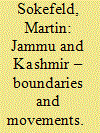

|
|
|
|
|
| Summary/Abstract |
Reacting very strongly to the statement of Pakistani prime minister, Yousuf Raza Gilani, in which he had said that Gilgit-Baltistan is part of Kashmir, the students of Gilgit-Baltistan staged a demonstration in front of National Press Club, Islamabad. They demanded apology from the prime minister for making ‘such baseless statements, contradicting his own past speeches and statements’. They also chanted slogans against the government for ‘playing with emotions of the people of Gilgit-Baltistan’. ( … ) The students said that people of GilgitBaltistan had fought a war of liberation and won it against a superior force of the Maharaja of Kashmir, also supported by Indian government. ‘The Kashmiris were invaders in our lands’, said a demonstrator. He further said, ‘we fought with them and made them flee the region but now the Pakistani political, civilian and military establishment is trying to murder our history of liberation.
|
|
|
|
|
|
|
|
|
|
|
|
|
|
|
|
| 5 |
ID:
142473
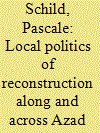

|
|
|
|
|
| Summary/Abstract |
With reference to anthropological approaches to state borders as processes, this paper examines ‘the border’ between Pakistan and Azad Kashmir through the window of reconstruction politics after the 2005 earthquake in Muzaffarabad, the capital of Azad Kashmir. Drawing on ethnographic fieldwork, I analyse how ‘the border’ became inscribed into politics and power relations in Muzaffarabad through a locally contested ‘reconstruction bureaucracy’ which provided Pakistan with the means to dominate reconstruction in Azad Kashmir. Activists from Muzaffarabad politicised the delay of reconstruction by addressing Pakistan's interference in Azad Kashmir's affairs. Local politicisation of reconstruction, however, revealed contradictory effects of ‘the border’ on power relations in Muzaffarabad. From the activists’ perspectives, political boundaries between Pakistan and Azad Kashmir were characterised by domination as well as cooperation that undermined local concerns such as the reconstruction of Muzaffarabad. Thus, local activists also opposed ‘their’ government and transgressed ‘the border’ into Pakistan through the creation of alliances with national actors in order to put pressure on the government of Azad Kashmir. In taking advantage of power disparities between Pakistan and Azad Kashmir, these alliances, however, not only reproduced but also undermined the nation state's domination over the region by manipulating and circumventing the ‘reconstruction bureaucracy’.
|
|
|
|
|
|
|
|
|
|
|
|
|
|
|
|
| 6 |
ID:
142471


|
|
|
|
|
| Summary/Abstract |
This article begins the process of conceptualizing the drawing of multiple borders across Kashmir in the postcolonial period from the perspective of partition. It reviews the literature on partition and borders to argue that vivisection and its politics has played a significant role in defining the nature of the ongoing crisis in the region. The making and traversal of divisions – territorial, material, and ideological – lies at the heart of making sense of the Kashmir issue and offers possibilities for its resolution.
|
|
|
|
|
|
|
|
|
|
|
|
|
|
|
|
|
|
|
|
|